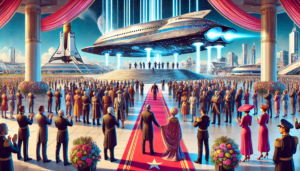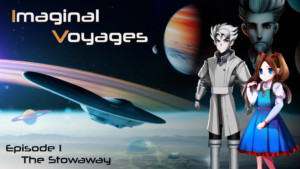 I am very pleased to announce that the Auditory Anthology podcast has featured “As the Founding Fathers Intended,” my very first short story published online, in its latest episode! Auditory Anthology is “a podcast featuring the best science fiction short fiction.” (Those are their words, mind you. Not mine.) Go here for a listen.
I am very pleased to announce that the Auditory Anthology podcast has featured “As the Founding Fathers Intended,” my very first short story published online, in its latest episode! Auditory Anthology is “a podcast featuring the best science fiction short fiction.” (Those are their words, mind you. Not mine.) Go here for a listen.
Category Archives: My Works
On Writing Science Fiction
(Author’s Note: If you have not yet read the short stories in question, you would be well-advised to do so when the links to them appear in this text, before you read any further in this article.)
When I announced the publication of “Blind Date,” one of my short science fiction stories, to social media, one commentator took issue with my classification of it as science fiction: They said the plot device of selective memory erasure was not enough for it to be sci-fi.
I begged to differ, and noted that it depends on one’s definition of science fiction. According to one such definition, the story contains a scientific concept of which the premise is dependent upon to work. Perhaps more specifically, I probably should have noted, the concept in question has not yet been confirmed to exist (e.g., extraterrestrial life), invented (teleportation), or come to fruition (manned interplanetary travel) at the time the story was written.
As there had never been a successful procedure of selective memory erasure when I had written “Blind Date,” and the story would not work with that as a plot device, I am confident it qualifies as science fiction. It’s one of the many narratives I’ve crafted where I introduce a possible future technology, and explore how society and humankind would likely be affected by it.
My inspiration for “As the Founding Fathers Intended,” for example, arose from my noticing how much political discourse in my country was centered around the intentions its founders had for it, many of which people can only speculate about today. What would Benjamin Franklin have said about the state of America today? What did the framers of the Constitution mean by “a well regulated militia”?
And then I thought to myself, what if it were possible for a country to maintain communication with its founders and adjust its policies accordingly? That made for an interesting premise. From there, I determined the means by which this plot would be possible. I considered cryogenic preservation for a while before setting on time dilation caused by space travel at close to the speed of light.
After that, I set out figuring how the rest of this society would function. Would anyone else besides the founders travel on this ship? Immediate family, perhaps? How often would they return to earth? How much power would they have over the current governmental body? What other activities would they partake in during their visit? What formalities and ceremonies would be held? How would their friends and family not on the ship be affected? Would there ever be a complication that prevents the visit from happening?
Finally, when I managed to establish reasonable- and likely-sounding answers to all these questions, I bundled everything into “As the Founding Fathers Intended,” a blend of science fiction and political satire that takes a look at a world where people could get definitive answers on how to run their country in the titular manner.
The creative process behind “Blind Date” was similar. I was pondering stories I’ve read about couples who met each other because of mass shootings and terrorist attacks, and how it must be awkward for them to live with such knowledge. From there, I thought, is there a way for them to fix this predicament, now or in the future? So I considered the possibility of selective memory erasure.
It wasn’t as complex a system as the one surrounding the plot of “As the Founding Fathers Intended,” because it didn’t need to be to address the problem in question. But it still dealt with a scientific concept that had yet to come to fruition at the time when it was written, so I have no doubt the story could be classified as science fiction.
I’m proud of “Blind Date,” particularly because it exemplifies the ability of fiction to tread where reality cannot. Even if everyone thinks to themselves how uneasy one might feel having met their romantic partner only because of a violent attack, it’s not as if society would permit them to discuss such a matter openly, especially with the people in question themselves (“Say, did you ever think about how…”). But fiction offers a refuge in which these matters can be explored, and science fiction allows for a far greater scope of hypothetical situations with which these matters can intersect.
Of course, not all technologies key to a sci-fi premise have to be a pipe dream. It could be something regarded by experts as inevitable and imminent, such as the present day’s relationship with the prospect of vast improvements in artificial intelligence. How will we cope with a reality where art and literature produced by machines outstrips that produced by people? How will the legal system adapt when it’s trivially easy to fabricate photographic and video evidence? Science fiction authors can try their hand at answering such questions before they grow to be truly pressing concerns.
I tried my own hand at tackling such issues with “Short Story Submission,” though the technology central to the story deals with means to counter unwanted use of AI rather than AI itself. Also of note is Alex Proyas’ lambasted adaptation of Asimov’s Robot stories, which for all its faults explored the topic strikingly presciently (albeit accidentally) in its best scene.
There is always the chance that what was science fiction at the time of the work’s writing becomes a reality later on, as was famously the case with many a Jules Verne story. That has yet to come true for any of my stories, but I have found out the hard way that the current understanding and lexicon surrounding science and technology can morph into something that’s not entirely compatible with previously published works of sci-fi. The public conversation about AI is evolving so rapidly that new readers of my novella Realia might not understand a joke it contains about “artificial intelligence,” which at the time of its writing was a term often used to denote the theoretical state of a machine as being conscious, sentient, and self-aware. While a disappointing turn of events for a writer, I suppose it is always a risk to consider when writing science fiction.
Science fiction is a useful genre in that it offers a vision of possibilities. While fiction explores the way things are, science fiction explores how things could be, and prepares humanity for the potential consequences of its actions.
Go For a Voyage — at No Cost
 I am pleased to announce the free release of the first entry in the visual novel anthology Imaginal Voyages, which is also the first of three entries to be written by me, and available at no charge. To play it, you will need a computer running Windows, macOS, Linux, or SteamOS, as well as a Steam account, but you won’t need to offer any payment. You can get it (not buy it) through this link.
I am pleased to announce the free release of the first entry in the visual novel anthology Imaginal Voyages, which is also the first of three entries to be written by me, and available at no charge. To play it, you will need a computer running Windows, macOS, Linux, or SteamOS, as well as a Steam account, but you won’t need to offer any payment. You can get it (not buy it) through this link.